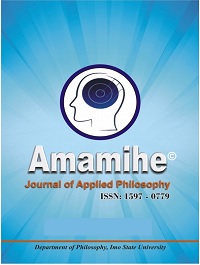EDUCATIONAL VALUE OF AFRICAN FOLKTALES
Résumé
African people are storytelling people. And these stories, usually about nature- plants, animals, the other aspects of the environment- are employed in daily conversations to mirror the ideas of the African people and their general outlook on life, conduct, and morals. It is such that they carry the traditions, culture, and life of the African people, not only as a means for the preservation of the African values but also as a means of communicating them to the next generation. This piece attempts to study the nature of African folktales, their types, and educational value. For the achievement of the aim and objectives of this work, the phenomenological and hermeneutic methods of inquiry will be employed. The Igwebuike theoretical framework will be used for the interpretation and understanding of the African reality and its relationships. This research discovered that apart from the African system of education, which is tied to roles such as farming, hunting, firewood gathering, etc., the African got much more instruction through tales, which has for centuries before the advent of Western education, served as an integrated classroom. It further recommended the employment of African indigenous folktales in educational institutions in Africa, more importantly, at the primary and secondary levels. In this way, the African will be taught within categories that he or she understands and appreciates.


